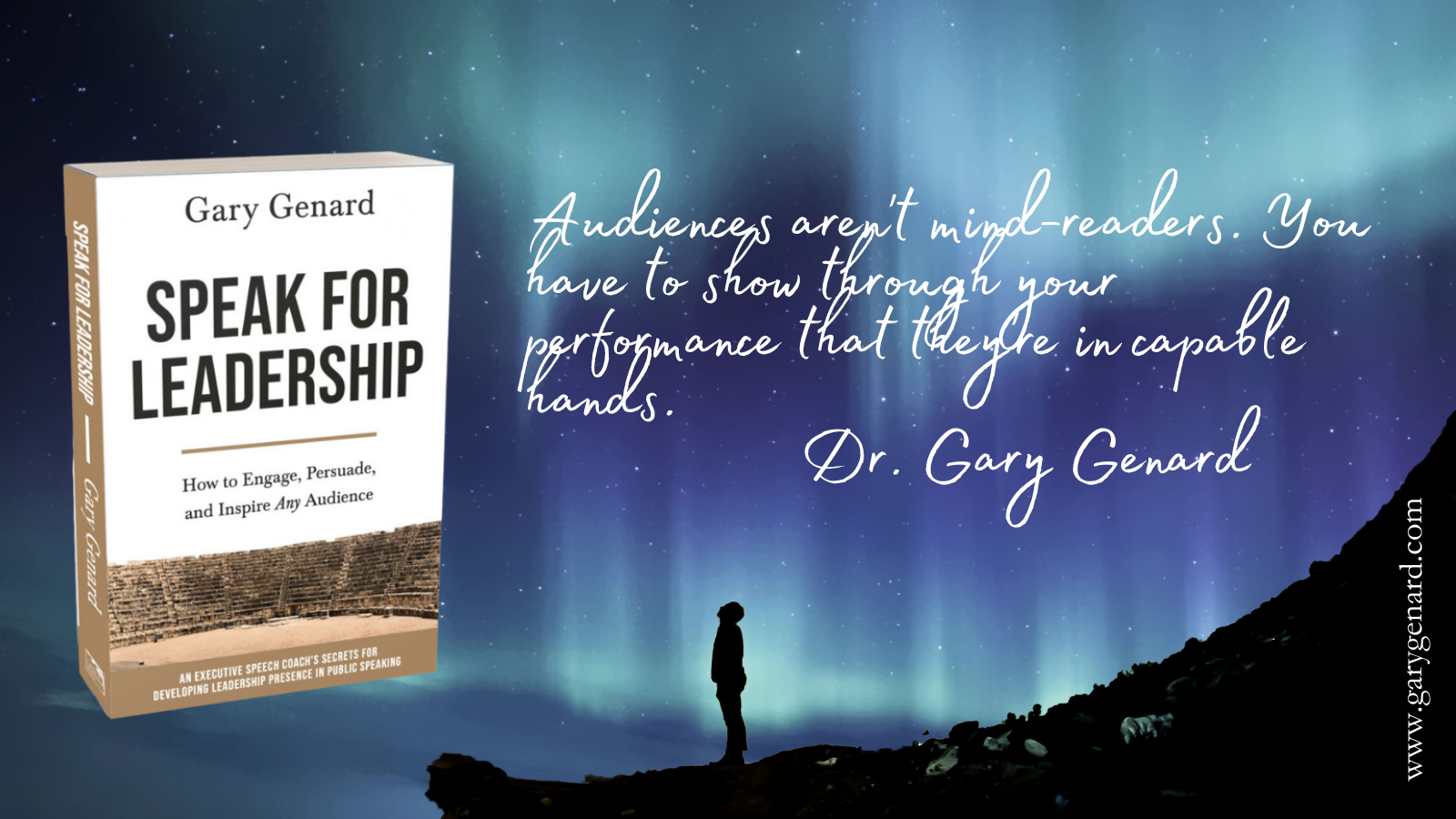Emotional intelligence matters greatly in public speaking. So, here's an important question: just how much emotion should you show when you speak?
The answer is: just enough. Which, not surprisingly, depends upon a number of factors. So, let's explore an interesting and vital juncture: emotions in public speaking and the audience's responses to them.
Here, we'll definitely be concerned with speaking performance—what I call "the oral arena."
Do you speak as a leader? Want to? Here's the book that will get you there: Speak for Leadership. On Amazon. Learn how to engage, persuade, and inspire any audience!
The Emotional Undercurrent of Every Speech
Somewhere along the line, too many of us learn that in business, emotions are risky. Business is serious, after all. In the end (we seem to think), it all comes down to financial impact, and presentations along those lines are no time to be fooling around. As my scientist clients tell me, they face a huge amount of negative pressure any time they let their emotions show regarding research. "Just show me the data!" is a phrase, apparently, they know too well. Here's my Free cheat sheet, "7 Tips for Overcoming Audience Resistance."
But here's the thing: we need emotions if we're going to decide about ANYTHING. You can thank your big intrusive brain for that. If your emotion center—the limbic system—is destroyed through trauma or disease, you can't make any decision, not matter how analytical it may seem. The conclusion is inescapable: if you're not leveraging your influence through emotion, you're making it damn difficult for audiences to agree with you, be motivated, and buy into your ideas! Here are 20 more ways to connect with an audience for lasting influence.
As I say to my public speaking clients: there's a river of emotion running underneath everything we say. And we ignore it to our (and our listeners') disadvantage.
Need to transform your confidence for that kind of control when you speak? Find 75 secrets for a more confident you in The Confidence Book. Believe in yourself!
75 Ways to Reduce Your Anxiety and Let Go of Your Fears!
How Much Emotion Should You Reveal?
So much, then, concerning why you should speak emotionally. Now for the proof-in-the-pudding: how do you speak on that emotional plane? And how much of it should you be showing?
The sooner you begin to think in terms of performance, the better! To know more, download my Free resource, "Great Speaking? It's About Performance Over Content."
To begin with, start thinking in terms of emotional language. Business language doesn't need to be cut-and-dried. In fact, as in any other field, it will suffer if that's the case. Whatever language you speak in, the chances are very good that you have access to a rich resource where precision, associative power, and connotation are at your disposal. The comparison that always comes to my mind to illustrate this has to do with the person who gave you birth. "Birthing parent," "maternal figure," "matriarch," and "female parent" are all accurate. But when you say, "Mother," you're saying infinitely more. So it is with your business speech.
What about the things you shouldn't say? Learn what they are in my Free cheat sheet, "25 Words to Avoid in Speeches and Presentations." Avoid weakening your influence!
Carefully explore the choices open to you, and you'll likely come up with something far more powerful than your original choice. After all, as Mark Twain said, "The difference between the right word and the almost right word, is the difference between lightning and the lightning bug."
Once you've invested your material with emotional relevance and likely impact on listeners, it's time to consider what you reveal in terms of emotion when you speak. And here, let me share with you the actor's paradigm or practice: Don't give them everything.
By all means, speak emotionally enough that what you feel is clear. But you must hold something back. When you do, the audience truly begins to understand the full power of that emotion you're showing. "Oh, my," they say to themselves when they can see that you're keeping something in reserve. "If he or she is this emotional about this, imagine how they'd act and speak if they let it all out!"
You should follow me on Twitter here.

Gary Genard is an actor, author, and expert in public speaking and overcoming speaking fear. His company, The Genard Method offers live 1:1 Zoom executive coaching and corporate group training worldwide. In 2022 for the ninth consecutive year, Gary has been ranked by Global Gurus as One of the World’s Top 30 Communication Professionals. He is the author of the Amazon Best-Seller How to Give a Speech. His second book, Fearless Speaking, was named in 2019 as "One of the 100 Best Confidence Books of All Time." His handbook for presenting in videoconferences, Speaking Virtually offers strategies and tools for developing virtual presence in online meetings. He also the author of Speak for Leadership: An Executive Speech Coach's Secrets for Developing Leadership Presence. His latest book is The Confidence Book: 75 Ways to Reduce Your Anxiety, Let Go of Your Fears, Change Your Negative Thinking, and Live Fully in the Moment. Contact Gary here.
Photo credit: Public Domain Image Archive from The Public Domain Review





